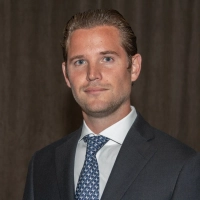How to Build Strong Relationships With Other Executives as CFO
Building strong relationships with fellow executives is crucial for a CFO's success. This article delves into effective strategies for fostering trust and collaboration at the executive level. Drawing from expert insights, it offers practical advice on communication, strategic alignment, and cross-departmental cooperation.
- Weekly Tea-Break Calls Foster Executive Trust
- Frame Financial Insights Within Strategic Goals
- Open Communication Enables Cross-Departmental Collaboration
- Collective Model Editing Builds Shared Ownership
- Earn Respect Through Cultural Awareness
- Cross-Departmental Workshops Empower Team Contributions
Weekly Tea-Break Calls Foster Executive Trust
Trust with globally distributed peers grows when information flows predictably. I hold a fifteen-minute "tea-break" video call every Monday with the CEO, COO, and CTO, cameras on, slides off. We share one win and one concern apiece, after which I translate supporting or contradicting financial signals. Decisions are summarised, owners assigned, and the note is posted instantly in our workspace. This live written recap is the habit I recommend: it removes ambiguity, provides a single source of truth, and shows accountability before we hang up. Over time, the archive proves that every voice shapes the plan, strengthening confidence in Finance.
Frame Financial Insights Within Strategic Goals
One practice that has been incredibly effective in building strong relationships with fellow executives is committing to financial transparency tied to strategic intent. Instead of presenting numbers in isolation, I focus on framing financial insights in the context of shared business goals—whether it's growth, innovation, or risk management. This approach turns financial conversations into strategic ones, where everyone feels aligned rather than siloed. Regular one-on-one syncs with peers also help surface cross-functional challenges early, creating space for trust to grow organically. It's this balance of clarity, context, and communication that keeps collaboration strong across the leadership table.
Open Communication Enables Cross-Departmental Collaboration
Building strong relationships with the executive team is all about communication. When I was CFO, I made it a point to have regular, informal check-ins with each member. These weren't just about discussing numbers or strategy; they were about understanding their priorities, challenges, and how finance could support them.
One practice that's been particularly effective is transparency. I keep the lines of communication open about financial insights and the reasoning behind decisions. This fosters trust because everyone knows they're in the loop and their input matters. Plus, when they see that finance is there to enable their goals, not restrict them, collaboration naturally follows. It's less about finance dictating terms and more about working together to steer the company in the right direction.

Collective Model Editing Builds Shared Ownership
Our leadership blends clinical, real estate, and hospitality expertise, so we prioritize alignment. Within 72 hours of any major capital project or regulatory milestone, I convene a "deal debrief." Everyone receives the full investment model, timeline, and variance analysis beforehand. In the session, each executive states one success and one lesson, then we update the rolling forecast together, cell by cell. Collective model editing is the single practice that builds the most trust. When the Chief Medical Officer watches staffing inputs alter cash burn and compliance adjusts risk estimates in real time, ownership becomes shared, and Finance is seen as a transparent toolkit rather than a back-office filter.

Earn Respect Through Cultural Awareness
Two of the most important elements pertaining to building and maintaining strong relationships with your executive colleagues are respect and trust.
Respect is earned and felt through a combination of factors that include cultural awareness, attunement, competency/integrity, and your ability to be influenced by another. Respect is something that is earned, can take time to cultivate, and is embodied and given. Simply put, one of the best ways to earn respect is to give it.
Culture includes influences and norms that pertain to ethnicity, identity, religion, family, values, and hierarchies. Attunement relates to your ability to be present with another, have empathy for another's experience, and to treat their views, contributions, and perspectives as valid, particularly when they are not in exact alignment with your own. Competency/integrity is embodied by doing what you say you are going to do. Competency does not necessarily equal perfection but impeccability; relating to your ability to show up, your resiliency, and your capacity to work to repair any previous relationship ruptures. Your ability to be open to influence and adaptable contributes to your team feeling connected and respected for their contributions.
Trust is earned through respect and safety. One of the surest ways to earn trust is to enhance your listening skills. Becoming proficient at mirroring and validation will enhance your ability to earn your team's collaboration and trust. Mirroring is simply paraphrasing and reflecting back to your team what you heard them say. This communicates valuing another's perspective and genuine care. Additionally, when you lead with validation, it inherently creates safety and facilitates greater trust. You do not have to agree with someone to validate them. All you are in essence saying is that, "given how you experience the world, I can see how you feel the way you feel or think the way you think." An example is an engineer who is concerned that the sales pipeline is too massive for his capabilities. He says something like, "My team cannot meet the incoming demand because I don't have enough people to create the product on time." A validating comment would be, "Given that your team is smaller than you would have hoped, I can see why you would be concerned that you cannot fulfill the order." After this validation and subsequent greater trust, you can then begin to problem-solve together.

Cross-Departmental Workshops Empower Team Contributions
In my experience as a CFO, building and maintaining strong relationships with the executive team hinges on transparent communication and shared goals. One practice I've found effective is regular cross-departmental workshops. For example, I might organize a quarterly workshop where finance collaborates directly with marketing and operations to brainstorm cost-effective strategies for a new product launch. This not only demystifies financial processes but also empowers other departments to contribute their insights, fostering a collaborative atmosphere.
In these workshops, I ensure that everyone's voice is heard, which builds mutual respect and trust. When team members see that their input is valued and genuinely considered in financial planning, it creates a culture of openness and shared responsibility.
A memorable takeaway is this: "Trust is built in the small spaces where transparency meets collaboration—keep those spaces open."




